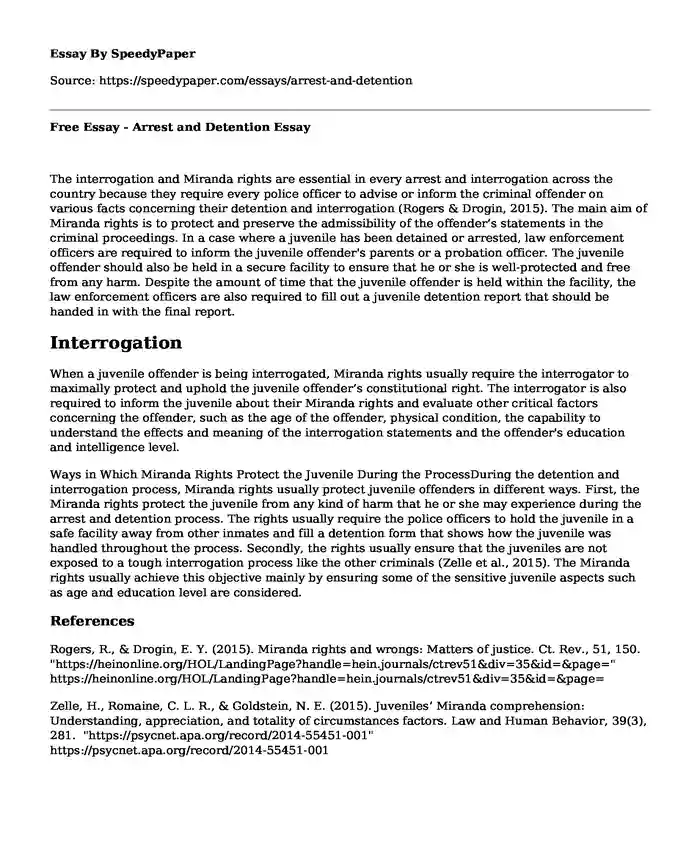
| Essay type: | Definition essays |
| Categories: | Criminal law Police Criminal justice |
| Pages: | 2 |
| Wordcount: | 445 words |
The interrogation and Miranda rights are essential in every arrest and interrogation across the country because they require every police officer to advise or inform the criminal offender on various facts concerning their detention and interrogation (Rogers & Drogin, 2015). The main aim of Miranda rights is to protect and preserve the admissibility of the offender’s statements in the criminal proceedings. In a case where a juvenile has been detained or arrested, law enforcement officers are required to inform the juvenile offender's parents or a probation officer. The juvenile offender should also be held in a secure facility to ensure that he or she is well-protected and free from any harm. Despite the amount of time that the juvenile offender is held within the facility, the law enforcement officers are also required to fill out a juvenile detention report that should be handed in with the final report.
Interrogation
When a juvenile offender is being interrogated, Miranda rights usually require the interrogator to maximally protect and uphold the juvenile offender’s constitutional right. The interrogator is also required to inform the juvenile about their Miranda rights and evaluate other critical factors concerning the offender, such as the age of the offender, physical condition, the capability to understand the effects and meaning of the interrogation statements and the offender's education and intelligence level.
Ways in Which Miranda Rights Protect the Juvenile During the ProcessDuring the detention and interrogation process, Miranda rights usually protect juvenile offenders in different ways. First, the Miranda rights protect the juvenile from any kind of harm that he or she may experience during the arrest and detention process. The rights usually require the police officers to hold the juvenile in a safe facility away from other inmates and fill a detention form that shows how the juvenile was handled throughout the process. Secondly, the rights usually ensure that the juveniles are not exposed to a tough interrogation process like the other criminals (Zelle et al., 2015). The Miranda rights usually achieve this objective mainly by ensuring some of the sensitive juvenile aspects such as age and education level are considered.
References
Rogers, R., & Drogin, E. Y. (2015). Miranda rights and wrongs: Matters of justice. Ct. Rev., 51, 150. "https://heinonline.org/HOL/LandingPage?handle=hein.journals/ctrev51&div=35&id=&page=" https://heinonline.org/HOL/LandingPage?handle=hein.journals/ctrev51&div=35&id=&page=
Zelle, H., Romaine, C. L. R., & Goldstein, N. E. (2015). Juveniles’ Miranda comprehension: Understanding, appreciation, and totality of circumstances factors. Law and Human Behavior, 39(3), 281. "https://psycnet.apa.org/record/2014-55451-001" https://psycnet.apa.org/record/2014-55451-001
Cite this page
Free Essay - Arrest and Detention. (2023, Sep 07). Retrieved from https://speedypaper.com/essays/arrest-and-detention
Request Removal
If you are the original author of this essay and no longer wish to have it published on the SpeedyPaper website, please click below to request its removal:
- Gun Control Essay Example, Free to Use
- Business Essay Example: Google v. China
- A Critical Review Essay of 'Shootings' by Adam Gopnik
- Paper Example. Importance of the Right for the Defendant's Presence
- Free Essay Example. A Search Warrant
- Essay Example: Authorized Access to Under the "Security Testing" Exception to Copyright Law
- Free Paper Sample on Empowerment of Women
Popular categories




